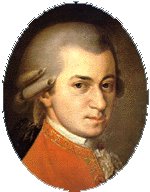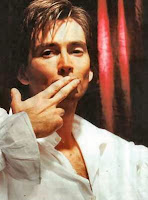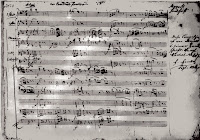
The big day–his 250th–is actually tomorrow, but I volunteered, although posting so late in the day it’s already 27th in Vienna.
Well, what can you say about Mozart that hasn’t been said, much better? Here’s Tim Page in last Sunday’s Washington Post:
It is now 250 years since Wolfgang Amadeus Mozart was born in Salzburg, Austria — and some 245 years since this prodigy among prodigies fashioned his first little pieces for keyboard under the helpful eye of his father, Leopold. The world has changed radically since 1756 but Mozart remains a constant — we continue to regard the mixture of clarity, grace and formal balance in his music with undiminished awe. He seems to have been incapable of vulgarity or overstatement: In his mature works, there is hardly a wasted gesture or a note out of place. And yet it all seems so effortless, so absolutely spontaneous.
Indeed, because Mozart’s music is so flowing, direct and eloquent, many listeners think it must be easy to perform. Nothing could be further from the truth. Although almost any third-year piano student can read through the Mozart sonatas, it is a different matter entirely to play them well . Many other composers demand more in terms of muscle, pyrotechnics and flashy virtuosity, but there is an extraordinary transparency to Mozart’s music, and any imbalance, no matter how slight, is glaringly obvious. As such, the interpretation of Mozart remains one of the supreme tests of any great musician.
Rather than rave about my favorite Mozart recordings/works (oh, okay. For the record, off the top of my head: Mitsuko Uchida playing the sonatas, Richard Goode and the Orpheus Chamber Orchestra playing the piano concertos, the Skittles Trio, the quintets, the Dissonance quartet, the piano quartets, the Requiem, the wind serenades, the Prague Symphony [38]–you know it’s time to stop when you’re in double parentheses)–I thought I’d actually try and relate this to the regency period. And this is actually a follow on from my last post on pianos–how they were used to bring orchestral music into the home.
I knew this happened later on in the century, with Liszt’s famous transcriptions of Wagner, for instance, but I was amazed to find how much material dated from our period, published in London, based on Mozart’s operas. I looked up music inspired by Don Giovanni, my favorite Mozart opera (I think, or is it The Magic Flute?) and found a website at the University of Southampton, England devoted to research on Mozart performances during the nineteenth century. And, not surprisingly, the majority of pieces are for piano, or piano four-hands, with flute and piano and flute duets coming in next. I have no idea who most of the arrangers were, and some were anonymous–Clementi (a music publisher as well as a composer and piano builder) was the only one I recognized. There were lots of arrangements of the overture (including one for harp and piano) and the big tunes, like the minuet from the final act, as you’d expect. C. von Boigelet, whoever he was, managed to concoct twelve gavottes from the opera. In 1809, The Royal Musical Magazine published an arrangement of Batti, batti (surely one of the most un-PC arias ever written) for piano four-hands.
 And in our own time there’s the movie Amadeus, a very fictional account of the rivalry between Mozart and Salieri, but eminently watchable.
And in our own time there’s the movie Amadeus, a very fictional account of the rivalry between Mozart and Salieri, but eminently watchable.
Any other Mozart faves or facts you’d like to share?












